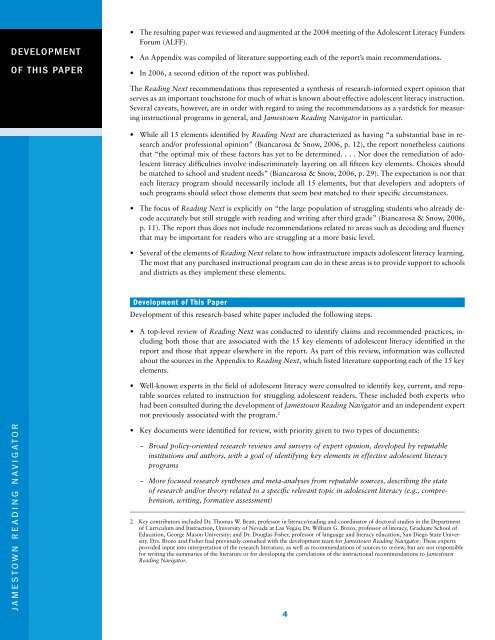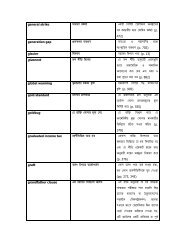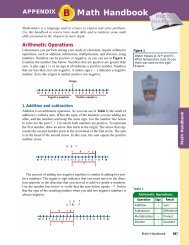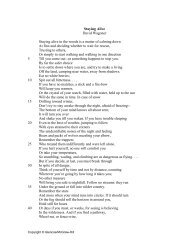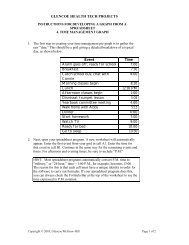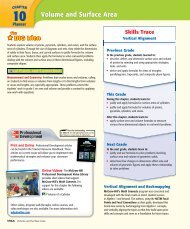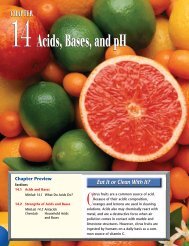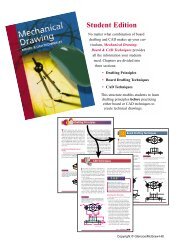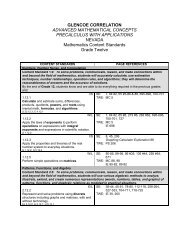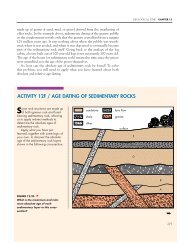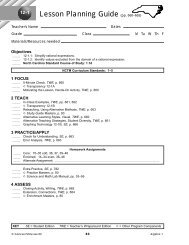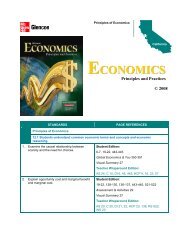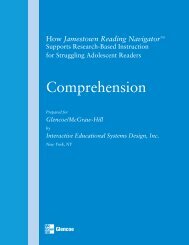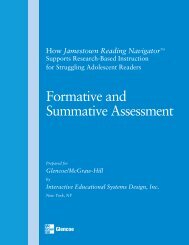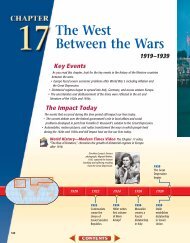Vocabulary - Research
Vocabulary - Research
Vocabulary - Research
Create successful ePaper yourself
Turn your PDF publications into a flip-book with our unique Google optimized e-Paper software.
development<br />
of this Paper<br />
• The resulting paper was reviewed and augmented at the 2004 meeting of the Adolescent Literacy Funders<br />
Forum (ALFF).<br />
• An Appendix was compiled of literature supporting each of the report’s main recommendations.<br />
• In 2006, a second edition of the report was published.<br />
The Reading Next recommendations thus represented a synthesis of research-informed expert opinion that<br />
serves as an important touchstone for much of what is known about effective adolescent literacy instruction.<br />
Several caveats, however, are in order with regard to using the recommendations as a yardstick for measuring<br />
instructional programs in general, and Jamestown Reading Navigator in particular.<br />
• While all 15 elements identified by Reading Next are characterized as having “a substantial base in research<br />
and/or professional opinion” (Biancarosa & Snow, 2006, p. 12), the report nonetheless cautions<br />
that “the optimal mix of these factors has yet to be determined. . . . Nor does the remediation of adolescent<br />
literacy difficulties involve indiscriminately layering on all fifteen key elements. Choices should<br />
be matched to school and student needs” (Biancarosa & Snow, 2006, p. 29). The expectation is not that<br />
each literacy program should necessarily include all 15 elements, but that developers and adopters of<br />
such programs should select those elements that seem best matched to their specific circumstances.<br />
• The focus of Reading Next is explicitly on “the large population of struggling students who already decode<br />
accurately but still struggle with reading and writing after third grade” (Biancarosa & Snow, 2006,<br />
p. 11). The report thus does not include recommendations related to areas such as decoding and fluency<br />
that may be important for readers who are struggling at a more basic level.<br />
• Several of the elements of Reading Next relate to how infrastructure impacts adolescent literacy learning.<br />
The most that any purchased instructional program can do in these areas is to provide support to schools<br />
and districts as they implement these elements.<br />
Development of This Paper<br />
Development of this research-based white paper included the following steps.<br />
• A top-level review of Reading Next was conducted to identify claims and recommended practices, including<br />
both those that are associated with the 15 key elements of adolescent literacy identified in the<br />
report and those that appear elsewhere in the report. As part of this review, information was collected<br />
about the sources in the Appendix to Reading Next, which listed literature supporting each of the 15 key<br />
elements.<br />
• Well-known experts in the field of adolescent literacy were consulted to identify key, current, and reputable<br />
sources related to instruction for struggling adolescent readers. These included both experts who<br />
had been consulted during the development of Jamestown Reading Navigator and an independent expert<br />
not previously associated with the program. <br />
J a m e s t o w n R e a d i n g N a v i g a t o r<br />
• Key documents were identified for review, with priority given to two types of documents:<br />
− Broad policy-oriented research reviews and surveys of expert opinion, developed by reputable<br />
institutions and authors, with a goal of identifying key elements in effective adolescent literacy<br />
programs<br />
− More focused research syntheses and meta-analyses from reputable sources, describing the state<br />
of research and/or theory related to a specific relevant topic in adolescent literacy (e.g., comprehension,<br />
writing, formative assessment)<br />
Key contributors included Dr. Thomas W. Bean, professor in literacy/reading and coordinator of doctoral studies in the Department<br />
of Curriculum and Instruction, University of Nevada at Las Vegas; Dr. William G. Brozo, professor of literacy, Graduate School of<br />
Education, George Mason University; and Dr. Douglas Fisher, professor of language and literacy education, San Diego State University.<br />
Drs. Brozo and Fisher had previously consulted with the development team for Jamestown Reading Navigator. These experts<br />
provided input into interpretation of the research literature, as well as recommendations of sources to review, but are not responsible<br />
for writing the summaries of the literature or for developing the correlations of the instructional recommendations to Jamestown<br />
Reading Navigator.


